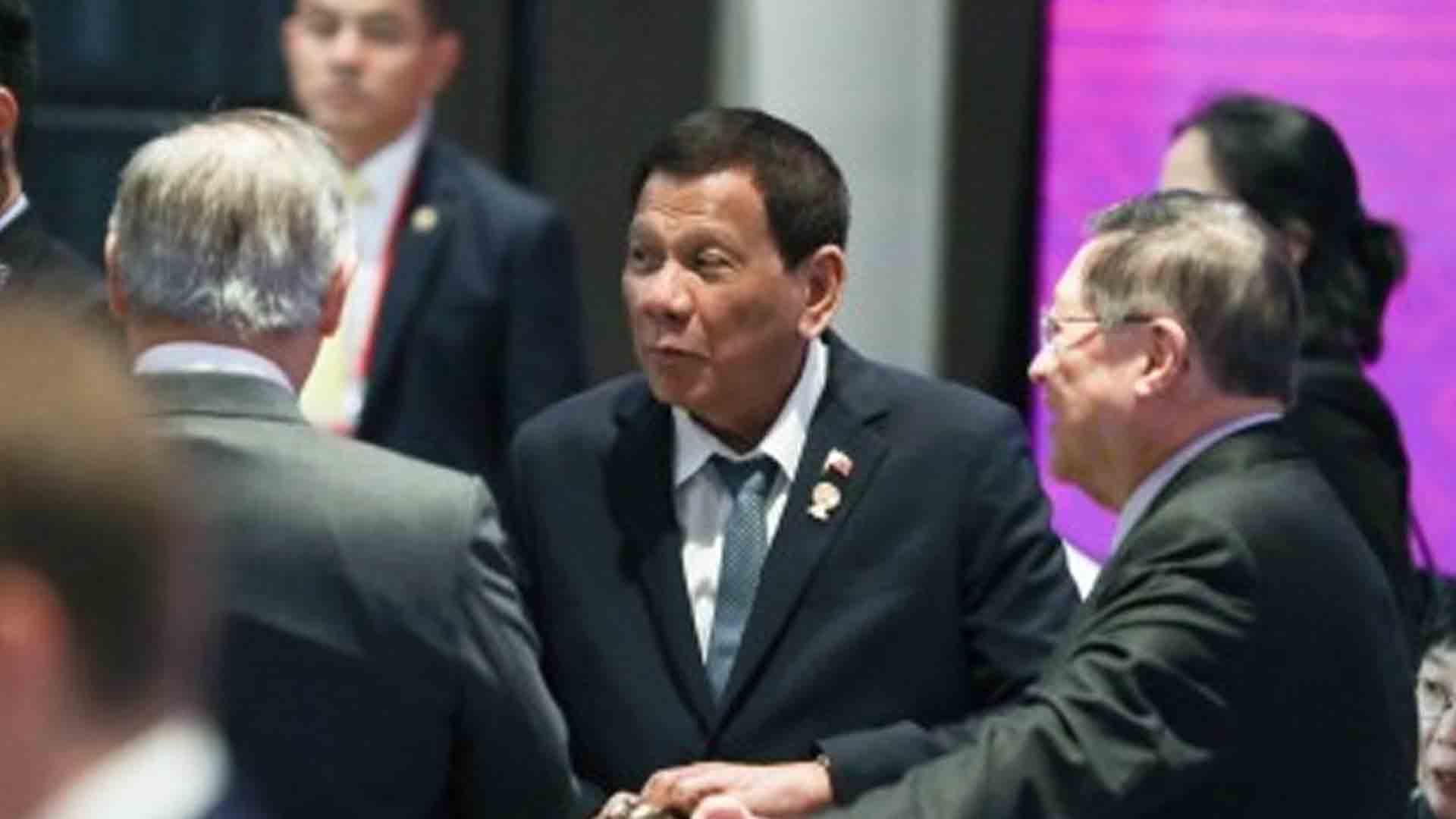President Rodrigo R. Duterte had a “fruitful” participation in the recently-concluded 35th Association of Southeast Asian Nations (Asean) Summit and Related Summits in Thailand, Malacañang said.
Duterte returned to Manila on Monday night following the conclusion of the Asean summit, the Palace said in a press statement.
“President Duterte took part in a series of interactive discussions with fellow Asean leaders and Dialogue Partners on regional strategic issues and promoting partnerships for sustainability,” Malacañang said.
It added that Duterte congratulated Thailand Prime Minister Chan-o-cha on the successful hosting of the summit that was held from November 2 to 4.
The Philippines, it said, participated in all summit meetings — the 35th Asean Summit Plenary, 22nd Asean-China Summit, 16th Asean-India Summit, 10th Asean-United Nations Summit, 22nd Asean Plus Three Summit, 7th Asean-United States (US) Summit, Special Lunch on Sustainable Development, 14th East Asia Summit, 22nd Asean-Japan Summit, and the 3rd Regional Comprehensive Economic Partnership (RCEP) Summit.
Duterte skipped several events during the third and last day of the summit and was instead represented by his Cabinet members.
Among the engagements, the President was unable to attend the 7th Asean-US Summit, the third RCEP Summit, and the closing ceremony of this year’s Asean Summit and the handing over of the chairmanship from Thailand to Vietnam.
On the sidelines of the summit, Duterte held a bilateral meeting with Japanese Prime Minister Shinzo Abe to reaffirm the Philippines’ strategic partnership with Japan.
In a Twitter post on Monday, Foreign Affairs Secretary Teodoro Locsin Jr. said the President missed some of the activities organized by the Asean, as the latter was scheduled to return to Manila at 7 p.m.
“If he (Duterte) didn’t catch the plane’s takeoff at 7 p.m., he’d be stuck. He left at 6 p.m. after Asean-Japan Summit, (bilateral meeting) with Japan, three hours of East Asia Summit — since he spoke first, he stayed ‘til last spoke as a courtesy. Others stepped out,” Locsin said.
44 outcome documents adopted
The three-day Asean Summit and Related Summits led to the adoption of a total of 44 outcome documents, including the Asean’s joint statement on climate change, as well as the East Asia Leaders’ statements on combatting the spread of illegal drugs, on cooperation to combat transnational crime, and on partnership for sustainability.
“The 35th Asean Summit and Related Summits concluded with a pledge to further strengthen regional solidarity and cooperation to promote peace and stability in the region and forge stronger partnerships with Dialogue Partners,” Malacañang noted.
The Palace said Duterte commended his fellow Southeast Asian leaders to decide with one voice to address the pressing issues, such as the “South China Sea disputes, transnational crimes, including trafficking of illicit drugs and terrorism, trade-related tensions, the export of hazardous and toxic wastes, and climate change.”
Duterte, as the country coordinator of the Asean-China dialogue, reiterated his stance at the summit on the need to craft an “effective and substantive” Code of Conduct in the South China Sea at the soonest time possible, Malacañang said.
“Noting the strategic importance of the South China Sea to all countries within and outside the region, the President stressed that the Philippines, as Country Coordinator of the Asean-China Dialogue, will do its utmost to conclude negotiations on a Code of Conduct (COC) as soon as possible,” it said.
“An effective and substantive COC is essential to maintaining peace and stability in the region,” it added.
Duterte and his fellow Asean leaders were “very concerned” about the unsettled disputes in the South China Sea, Presidential Spokesperson Salvador Panelo said on Sunday.
The proposed COC in the South China Sea is a legally binding pact that seeks to promote peace and stability in the busy waterway.
Malacañang said the Chief Executive also raised concern over the ongoing trade tensions between key partners “that could slow down growth, thus undermining food security and poverty alleviation efforts.”
It was referring to the trade war between the US and China that is affecting Asean economies.
“He (Duterte) called for an open, fair and rules-based international trading system,” the Palace said.
“In the context of a changing regional landscape, President Duterte urged the United States and China to exercise strategic restraint and continue on the path of inclusiveness and cooperation,” it added.
Duterte also called for the immediate conclusion of the negotiations on the crafting of RCEP, a free trade deal between the Asean and its six free trading agreement partners, as he emphasized that “deeper” economic integration is key to sustaining growth, Malacañang said.
“He emphasized that the Philippines is for an open, inclusive, and rules-based order where Asean centrality is an essential element of the regional security architecture,” it said.
With regard to the unlawful shipping of hazardous and toxic waste to developing countries, the President opposed the act as it is considered as an insult to a nation’s “dignity.”
“Amidst growing concerns over hazardous and toxic waste, President Duterte told Leaders at a Special Lunch on Sustainable Development that it is not right for developed countries to export their waste to developing countries,” Malacañang said.
“It violates international environmental law and is an affront to national dignity,” it added.
The Philippines, through the Basel Convention it ratified in March 1989, allows a foreign country to import hazardous waste, provided that it secures prior informed consent from the government.
In May this year, Duterte announced that the Philippines would no longer accept any waste from any country, after being piqued by Canada’s failure to take back its tons of garbage shipped to the Philippines six years ago.
The garbage row threatened diplomatic ties between the two nations. On May 31, the tons of trash were shipped back to Canada, two weeks after the deadline set by Duterte. (PNA)









